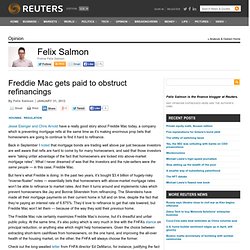

Slow Response to Housing Crisis Now Weighs on Obama - NYTimes.com. Still Getting the Housing Bubble Wrong. The collapse of the housing bubble led to the downturn.
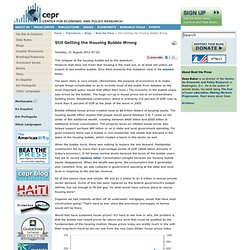
However that does not mean that housing is the road out, or at least not unless we expect to see another bubble. Ezra Klein presents this mistaken view in his column today. The basic story is very simple. Lenders Returning to the Lucrative Subprime Market. America Underwater. Short sales are rising as banks start to shun foreclosures - Mar. 1. Short sales are rising as banks start to shun foreclosures.
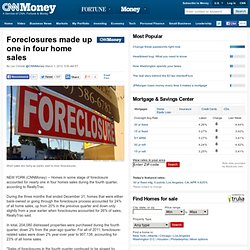
NEW YORK (CNNMoney) -- Homes in some stage of foreclosure accounted for nearly one in four homes sales during the fourth quarter, according to RealtyTrac. During the three months that ended December 31, homes that were either bank-owned or going through the foreclosure process accounted for 24% of all home sales, up from 20% in the previous quarter and down only slightly from a year earlier when foreclosures accounted for 26% of sales, RealtyTrac said. In total, 204,080 distressed properties were purchased during the fourth quarter, down 2% from the year-ago quarter. For all of 2011, foreclosure-related sales were down 2% year-over year to 907,138, accounting for 23% of all home sales.
Short sales on the rise Short sales are starting to become the preferred method for banks to dispose of properties in default. Meanwhile, sales of bank-owned homes fell 12% year-over-year to 116,000, comprising 13% of all sales during the quarter. Buffett: Banks Victimized by Evicted Homeowners. Warren Buffett, who controls the biggest shareholding of the No. 1 U.S. mortgage lender, said banks were victimized by some homeowners who refinanced their loans before getting evicted.
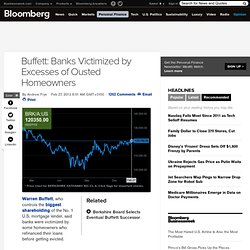
“Large numbers of people who have ‘lost’ their house through foreclosure have actually realized a profit because they carried out refinancings earlier that gave them cash in excess of their cost,” Buffett, chairman and chief executive officer of Berkshire Hathaway Inc. (BRK/A), said Feb. 25 in his annual letter. Robert Kuttner: The Volcker Rule: Return to Sender. Paul Volcker deserves better.

In the hands of Tim Geithner's Treasury, the Rule named for Volcker supposedly limiting speculative mischief by government-guaranteed banks is fast becoming a cumbersome parody of itself. Financial regulatory officials, at the behest of Wall Street, have turned a simple bright line into a convoluted monstrosity. The questionnaire alone, inviting comments, runs 530 pages. The bankers and their allies in government have succeeded once again in making their financial engineering too complex to regulate.
California Audit Finds Broad Irregularities in Foreclosures. Examining the big lie: How the facts of the economic crisis stack up. Global liquidity and risk appetite: a re-interpretation of the recent crises. Speech by Benoît Cœuré, Member of the Executive Board of the ECB, at the BIS- ECB Workshop on Global liquidity and its international repercussions, Frankfurt am Main, 6 February 2012 1.
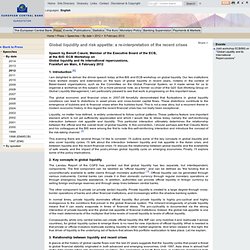
What An Economist Learned From Reading 21 Books About The Crisis : Planet Money. Hide captionNow read 15 more.
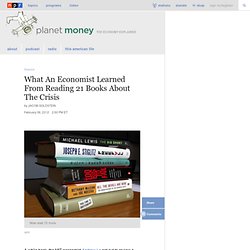
A while back, the MIT economist Andrew Lo set out to review a couple books about the financial crisis. Those books led to a couple more books, which led — you see where this is going — to 17 more books. Now, Lo is about to publish "Reading About The Financial Crisis: A 21-Book Review" (PDF). Reading 21 books about the financial crisis does not sound, on its face, like a fun experience.
Freddie Mac’s big bet against homeowners. ProPublica’s Jesse Eisinger and NPR’s Chris Arnold have discovered that Freddie Mac has used a complex derivative transaction to place large bets that rely on millions of American homeowners remaining in overpriced mortgages to pay off.

The bets in Freddie’s investment portfolio — which totaled $3.4 billion in 2010 and 2011 — directly contradict the housing giant’s stated mission to provide affordable mortgages to Americans. Freddie’s bet against refinancing — known as an “inverse floater,” which depends on mortgages interest payments — underscores a central tension between the White House and the Federal Housing Finance Agency, which gained conservatorship of Fannie and Freddie after the crisis. When Freddie and Fannie’s huge investment portfolios profit, it helps reduce the potential burden on taxpayers.
That’s been a priority for FHFA under Edward DeMarco’s leadership. Freddie Mac gets paid to obstruct refinancings. Jesse Eisinger and Chris Arnold have a really good story about Freddie Mac today, a company which is preventing mortgage refis at the same time as it’s making enormous prop bets that homeowners are going to continue to find it hard to refinance.
